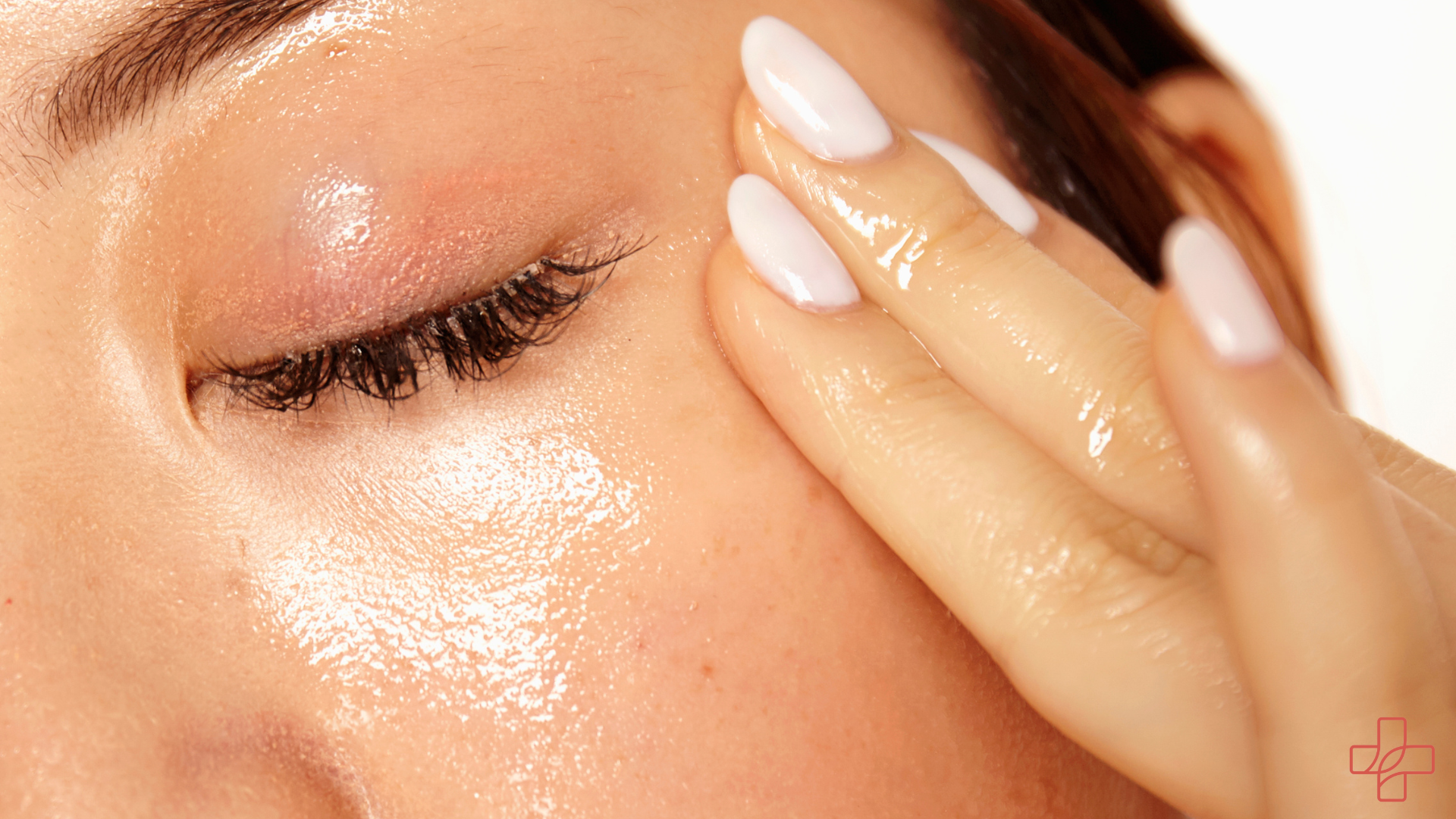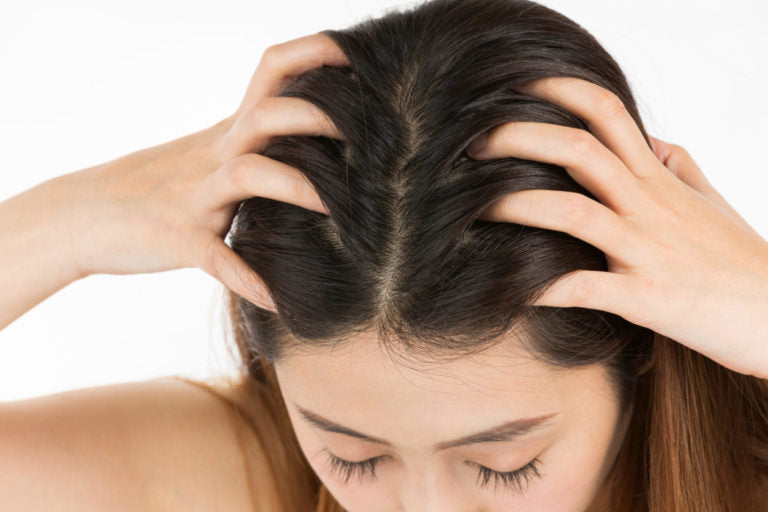Abschürfung
Hautabschürfungen sind oberflächliche Verletzungen, die durch das Abschaben der obersten Hautschicht entstehen.
Empfehlung
Akne
Akne zeichnet sich durch eine gesteigerte Talgbildung (Seborrhoe) und eine Verhornungsstörung im Bereich der Talgdrüsenfollikel aus. Akne ist gekennzeichnet durch rote, oft entzündliche und auch offene Hautstellen. Dabei ist Akne auch oft erhaben bis hin zur Pustelbildung.Bevorzugt betroffen sind Gesicht, Nacken und Dekolleté, Brust und Rücken. Manchmal kommen Varianten von Akne auch unter den Achseln sowie in der Genital-, Gesäß- und Leistenregion vor.
Empfehlung
Akne auf der Kopfhaut
Akne zeichnet sich durch eine gesteigerte Talgbildung (Seborrhoe) und eine Verhornungsstörung im Bereich der Talgdrüsenfollikel aus. Akne ist gekennzeichnet durch rote, oft entzündliche und auch offene Hautstellen. Dabei ist Akne auch oft erhaben bis hin zur Pustelbildung.
Bevorzugt betroffen sind Gesicht, Nacken und Dekolleté, Brust und Rücken – aber auch auf der Kopfhaut, insbesondere in der Nackenpartie kann es zu einer Akne kommen.
Empfehlung
Akne unter dem Bart
Bei Akne unter dem Bart handelt es sich wie bei der Akne um eine gesteigerte Talgbildung (Seborrhoe) und eine Verhornungsstörung im Bereich der Talgdrüsenfollikel.
Akne ist gekennzeichnet durch rote, oft entzündliche und auch offene Hautstellen. Dabei ist Akne auch oft erhaben bis hin zur Pustelbildung.
Empfehlung
Atopisches Ekzem
In der akute Phase, Läsionen sind stark juckende, rote, verdickte, schuppige Flecken oder Plaques, die durch Kratzen erodieren können.
Empfehlung
Avulsio
Eine Avulsion ist eine schwere Wunde, die zu einem teilweisen oder vollständigen Abriss der Haut und des Gewebes führen kann.
Empfehlung
Bart-Haarausfall
Der fachsprachliche Begriff Alopecia barbaebezieht sich auf den kreisrunden Haarausfall am Bart.
Erste Anzeichen sind oft eine schuppige Haut.
In der Folge entstehen runde, kahle Stellen im Bart. In seltenen Fällen kann der Haarausfall auf Augenbrauen und Haupthaar übergreifen.
Empfehlung
Bart-Haarausfall
Der fachsprachliche Begriff Alopecia barbaebezieht sich auf den kreisrunden Haarausfall am Bart.
Erste Anzeichen sind oft eine schuppige Haut. In der Folge entstehen runde, kahle Stellen im Bart.
In seltenen Fällen kann der Haarausfall auf Augenbrauen und Haupthaar übergreifen.
Empfehlung
Bartflechte
Bei der so genannten „Bartflechte“ (medizinisch „Tinea barbae“, in der Fachliteratur auch „Ringworm of the Beard“ genannt) handelt es sich um eine durch Pilze hervorgerufene Hauterkrankung, die speziell bei Männern auftritt. Äußerlich ist sie durch rötliche, schuppige, runde Flecken gekennzeichnet. Bei stark entzündlichen Formen kommt es zudem oftmals zu Fieber und peripher zu Lymphknotenbefall. Forcierte Formen der Bartflechte heilen nicht selbst ab, sondern bedürfen einer antimikrobiellen Behandlung.
Empfehlung
Chronisches Ekzem
Bei wiederholtem oder dauerhaftem Kontakt mit dem Auslöser heilt das Ekzem nicht ab und wird chronisch. Es ist durch trockene, schuppende Haut, gesteigerte Verhornung und Juckreiz gekennzeichnet.
Empfehlung
Dermatitis
Eine Dermatitis ist eine meist chronische, ekzemische Hauterscheinung und eine der häufigsten Hauterkrankungen. Nahezu jeder Mensch erkrankt zumindest einmal im Leben daran. Es sind chronische, entzündliche, meist juckende, nicht ansteckende Hautkrankheiten, die in verschiedenen Formen auftreten.
Empfehlung
Dermatose
Dermatosen sind chronische Ekzeme, d.h. forcierte Entzündungen der oberen Hautschichten (Oberhaut und Lederhaut). Es gibt viele unterschiedliche Arten von Dermatosen, die meistens gerötet sind und heftig jucken können. Charakteristisch ist auch die Bildung von nässenden Bläschen.
Besteht ein Ekzem über einen längeren Zeitraum, kann die Haut stark austrocknen und Schuppen bilden. Die durch die Dermatose veränderte Haut verliert die Barrierefunktion, was einen gesteigerten Wasserverlust zur Folge hat. Die Haut wird spröde und rissig.
Empfehlung
Eingewachsene Barthaare
Eingewachsene Barthaare werden durch die Haut durchstoßende Haare verursacht. Dies geschieht, was das das Haarfollikel verlässt und sich dann wieder zurück in die Haut krümmt.
Empfehlung
Eiterbläschen
Eiterbläschen – auch Pusteln, Pickel oder Wimmerl genannt – sind mit Eiter gefüllte, bei Berührung meist schmerzhafte kleine Hohlräume auf der Hautoberfläche. Sie haben eine rote Farbe, wobei die Spitze der Blasen häufig weiß gefärbt ist.
Empfehlung
Ekzeme
Das Ekzem ist eine der häufigsten Hauterkrankungen. Nahezu jeder Mensch erkrankt zumindest einmal im Leben daran. Die Bezeichnung Ekzem ist ein Sammelbegriff für entzündliche, meist juckende, nicht ansteckende Hautkrankheiten, die in verschiedenen Formen auftreten.
Häufige Formen von Ekzemen sind insbesondere:
– Dermatitis,
– Dermatose,
– Juckflechte.
Empfehlung
Erosion
Erosionen sind offenliegende Hautbereiche durch teilweisen oder vollständigen Verlust der Epidermis. Erosionen können traumatisch sein oder bei zahlreichen entzündlichen oder infektiösen Hauterkrankungen auftreten.
Empfehlung
Exkoriation
Als Exkoriation bezeichnet man einen flächigen Substanzdefekt der Haut, der bis in das Stratum papillare der Dermis reichen kann. Dadurch werden einzelne Kapillarschlingen eröffnet, sodass punktförmige Blutungen die Folge sind. Eine Exkoriation heilt i.d.R. narbig ab.
Empfehlung
Gesteigerte Talgbildung
Merkmale
Akne zeichnet sich durch eine gesteigerte Talgbildung (Seborrhoe) und eine Verhornungsstörung im Bereich der Talgdrüsenfollikel aus. Bevorzugt betroffen sind Gesicht, Nacken und Dekolleté, Brust und Rücken.
Empfehlung
Hautabschürfung
Schürfwunden sind Schädigungen der oberen Hautschichten, die durch Reibung an rauen Oberflächen entstehen.
Empfehlung
Intensiv getöntes Haar
Verweisender Begriff, siehe Eintrag: Coloriertes Haar
Intensive Haartönung
Verweisender Begriff, siehe Eintrag: Coloriertes Haar
Juckflechte
Ein Ekzem (Juckflechte) ist eine nicht infektiöse Entzündung der Haut, die mit Juckreiz einhergeht. Im akuten Stadium kommt es zu Rötung, Bläschen und Krusten auf der Haut. Weiters kann die betroffene Stelle nässen oder anschwellen
Empfehlung
Komedonen
Unter Komedonen (Mitesser, Komedi) versteht man eine Hautunreinheit, die besonders in der Pubertät und im frühen Erwachsenenalter auf der Basis eines fett-feuchten Hautzustandes (Seborrhoe) entsteht.
Empfehlung
Kontaktekzem
Ein allergisches Kontaktekzem (auch Kontaktallergie genannt) ist eine immunologisch vermittelte (allergische) Reaktion der Haut, die mit einer nicht-infektiösen Entzündungsreaktion einhergeht und an der Stelle auftritt, an der die Haut mit dem allergischen Auslöser (Allergen), in Kontakt gekommen ist.
Empfehlung
Lichtdermatose
Als Lichtdermatose wird eine Erkrankung der Haut bezeichnet, bei der ein Kontakt mit Sonnenstrahlen Hautirritationen hervorruft.
Empfehlung
Mallorca-Akne
Die Mallorca-Akne ist eine Spezialform der Sonnenallergie und wird insbesondere durch die in herkömmlichen Sonnenschutzmitteln enthaltenen Emulgatoren ausgelöst. Sie entsteht aus deren Reaktion mit fettigen Sonnenschutzmitteln oder Talgdrüsensekret unter starker Einwirkung von UV-A-Strahlung.
Empfehlung
Nesseln
Quaddeln bzw. Nesseln sind kleine, meist mit Lymphe / Wundwasser gefüllte Bläschen, die als Allergiemerkmal oder durch Fremdkörpereinwirkung (Blasen bei Druckstellen oder Insektenstiche) auftreten.
Empfehlung
Nesselsucht
Quaddeln bzw. Nesseln sind kleine, meist mit Lymphe / Wundwasser gefüllte Bläschen, die als Allergiemerkmal oder durch Fremdkörpereinwirkung.
Empfehlung
Neurodermitis
Neurodermitis ist eine chronische, nicht ansteckende Hauterkrankung. Bei Neurodermitis liegt ein gestörtes Gleichgewicht des Stratum corneum der Haut sowie des Zellmembrankomplexes vor. Die Haut reagiert hierauf symptomatisch mit forcierten Rötungen, Ekzemen sowie übermäßiger Schuppenbildung. Typische Anzeichen sind folglich Hautausschlag und starkes Jucken.
Empfehlung
Pickel
Pickel – auch Eiterbläschen, Pusteln oder Wimmerl genannt – sind mit Eiter gefüllte, bei Berührung meist schmerzhafte kleine Hohlräume auf der Hautoberfläche. Sie haben eine rote Farbe, wobei die Spitze der Blasen häufig weiß gefärbt ist.
Empfehlung
Psoriasis
Die Schuppenflechte (Fachbegriff: Psoriasis) ist eine entzündliche, nicht ansteckende Erkrankung. Sie macht sich vor allem durch rötliche, schuppende Hautveränderungen bemerkbar, die jucken können. Die chronische Erkrankung verläuft typischerweise in Schüben – mal mit stärkeren, leichteren oder gar keinen Hautproblemen.
Empfehlung
Pusteln
Pusteln – auch Eiterbläschen, Pickel oder Wimmerl genannt – sind mit Eiter gefüllte, bei Berührung meist schmerzhafte kleine Hohlräume auf der Hautoberfläche. Sie haben eine rote Farbe, wobei die Spitze der Blasen häufig weiß gefärbt ist.
Empfehlung
Quaddeln
Quaddeln bzw. Nesseln sind kleine, meist mit Lymphe / Wundwasser gefüllte Bläschen, die als Allergiemerkmal oder durch Fremdkörpereinwirkung (Blasen bei Druckstellen oder Insektenstiche) auftreten.
Empfehlung:
Rasurbrand
Rasurbrand ist eine Hautreizung, die nach dem Rasieren auftritt. Es wird typischerweise durch mehrere Faktoren verursacht, darunter:
Reibung: Die Rasierklinge kann die obere Schicht der Haut reizen und kleine Schnitte oder Mikroverletzungen verursachen. Das insbesondere, wenn nicht genügend Rasierschaum oder Rasiergel verwendet wird.
Einwachsen der Haare: Manchmal wachsen nach dem Rasieren die Haare in die Haut zurück und verursachen Entzündungen.
Empfindlichkeit: Einige Menschen haben eine empfindlichere Haut, die sensibler auf das Rasieren reagiert und Rasurbrand entwickeln kann.
Empfehlung
Schuppenflechte
Die Schuppenflechte (Fachbegriff: Psoriasis) ist eine entzündliche, nicht ansteckende Erkrankung. Sie macht sich vor allem durch rötliche, schuppende Hautveränderungen bemerkbar, die jucken können. Die chronische Erkrankung verläuft typischerweise in Schüben – mal mit stärkeren, leichteren oder gar keinen Hautproblemen.
Empfehlung
Schuppige Haut
Schuppige Haut entsteht durch die Störung der sogenannten Schutzschicht der Haut, welche für das Gleichgewicht zwischen dem Absterben von alten und der Bildung von neuen Hautzellen verantwortlich ist. Die Ursachen für schuppige Haut können zahlreich sein. Die Schutzschicht der Haut selbst besteht aus Feuchtigkeit und einem Lipidfilm.
Fachsprachlich wird schuppige Haut als Squama oder auch als Pityriasis capitis bezeichnet.
Empfehlung
Schürfwunde
Eine Schürfwunde ist eine oberflächliche Wunde, bei der die Haut durch Abrieb verletzt wird. Die Haut wird regelrecht abgeschliffen. Je nachdem, wie hart und rau die Oberfläche ist, an der sich die Haut abschürft, kann es zu unterschiedlichen Arten von Schürfwunden kommen.
Empfehlung
Seborrhoe oleosa
Seborrhoe oleosa bezeichnet eine gesteigerte Talgbildung der Haut, d.h. einen fettigen Hautzustand. Sie tritt meist mit einer Verhornungsstörung im Bereich der Talgdrüsenfollikel auf und führt somit zur Akne.
Empfehlung
Seborrhoe sicca
Die Seborrhoe sicca zeichnet sich durch trockenen Hautzustand aus. Hautzellen trocknen verfrüht aus, woraus eine forcierte Keratinisierung (Schuppenbildung) resultiert. Die Haut ist trockener als üblich.
Für das Entstehen einer Seborrhoe sicca können eine trockene Umgebung, die den Wasseranteil der Haut vorzeitig verdampfen lässt, oder die überreichliche Produktion des hauteigenen Hydrolipidfilms verantwortlich sein.
Empfehlung
Sensible Haut
Sensible / empfindliche Haut lässt sich schwer über konkrete Symptome definieren. Die Haut ist in erster Linie deutlich empfindsamer als andere Hauttypen.
Während die normale Haut eine ideale Talgproduktion und einen intakten Zellmembrankomplex aufweist, sowie bei der fettigen Haut die Talgproduktion erhöht ist, kommen bei der sensiblen Haut mehrere Umstände zusammen: Sie verfügt meist nicht über einen ausreichenden natürlichen Schutz durch den hauteigenen Zellmembrankomplex. Weiterhin ist ihr Feuchtigkeitshaushalt irritiert. Sie reagiert deshalb gereizter auf äußere Faktoren.
Empfehlung
Sonne
MerkmaleUV-Strahlung auf der Haut kann zu Problemen führen.
Empfehlung
Sonnenallergie
Sonnenallergien sind Reaktion auf Sonneneinwirkung in Kombination mit den Wirkstoffen herkömmliche Sonnenschutzprodukte. Diese nutzen zwei Wirkstoff-Arten:
1. Absorptive Wirkstoff-Arten: Das sind organisch-chemische UV-Absorber, deren Moleküle die UV-Strahlen der Sonne absorbieren. Zu ihnen gehört zum Beispiel Octinoxat.
2. Reflektive Wirkstoff-Arten: Dabei handelt es sich um mineralische Filter, die das Sonnenlicht reflektieren – wie eine Reihe winziger Spiegel. Titandioxid ist dafür ein Beispiel.
Empfehlung
Sonnenbrand
Medizinisch gesehen ist Sonnenbrand eine Hautverbrennung 1. oder 2. Grades.
Sonnenbrand wird – wie es der Name schon sagt – durch Sonnenlicht ausgelöst, spezieller bezeichnet durch ultraviolette, nämlich UVB- und UVC-Strahlung. Treffen UVB- oder UVC-Strahlen auf menschliche Haut, so regen sie diese zur Produktion von Radikalen an. Diese Radikale wiederum sind die unmittelbare Ursache von Sonnenbrand.
Empfehlung
Sonnenschutz
Verweisender Begriff, siehe Eintrag: Sonnenbrand
Talgige Haut
Seborrhoe oleosa bezeichnet eine gesteigerte Talgbildung der Haut, d.h. einen fettigen Hautzustand. Die Verhornung kann zu Akne führen.
Empfehlung
Trockene Haut
Bei trockener Haut ist die natürliche Fett- und Feuchtigkeitsregulation der Haut gestört. Die Haut wird rau und spröde, im Extremfall bilden sich Risse und Ekzeme. Besonders Senioren leiden häufig unter trockener Haut, weil die Haut mit zunehmendem Alter weniger Feuchtigkeit hält.
Empfehlung
Urtica
Verweisender Begriff, siehe Eintrag: Nesseln
Urticarium
Verweisender Begriff, siehe Eintrag: Nesseln
Urtikaria
Verweisender Begriff, siehe Eintrag: Nesseln
Wimmerl
Verweisender Begriff, siehe Eintrag: Pusteln



